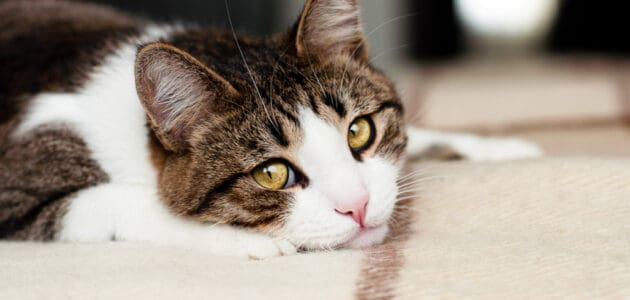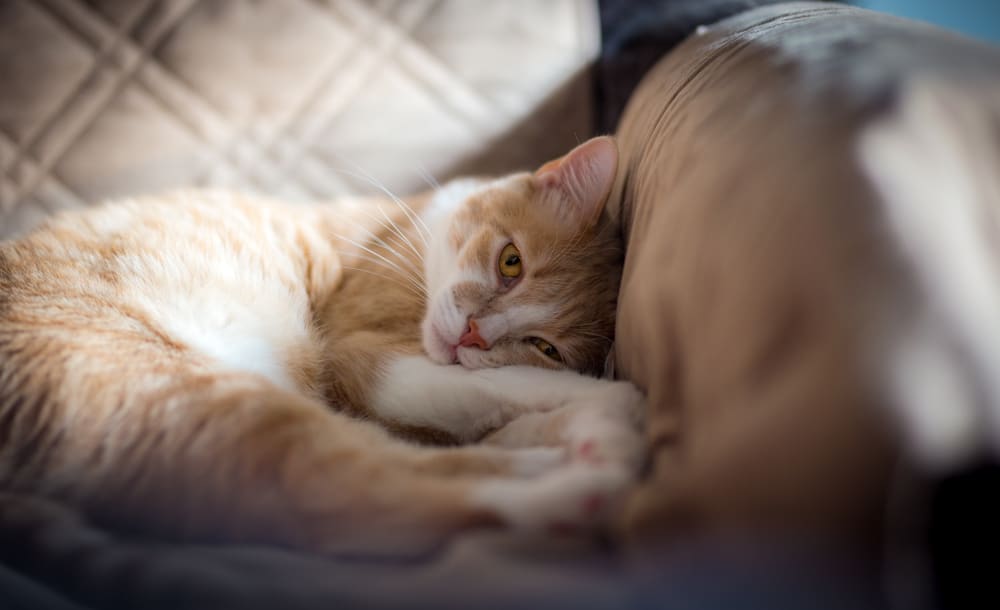How to Comfort and Care for a Dying Cat

Death, as they say, is the great leveler. We all have to face it, humans and animals alike. If you have a cat that you think is nearing its end, then your thoughts must be turning about how to best comfort it.
As unpleasant as it may seem, thinking about the death of a beloved pet is something that we all have to do at one point or another. Even if your pet is healthy, you’ll want to know some strategies should the worst occur.
No matter your and your pet’s circumstances, you should be aware of the different ways to support your cat in its final moments. In this article, we’ll tell you everything you need to know about how to comfort a dying cat.
How to Tell if Your Cat Is Nearing Its End
It’s important to know for sure the signs that accompany your pet’s soon-coming demise. At best, you’d be wasting a whole lot of time and emotional energy in grieving over what turns out to be a temporary condition. At worst, you’d end up making your cat suffer more than it should in its final moments.
Here are some signs to watch out for if you think your pet is dying. Keep in mind that one sign alone is usually not a cause for alarm, but the presence of two or more signs is a good enough reason to head to the vet or at least prepare yourself for what’s to come.
Changes in Eating Habits
Difficulty in eating or drinking is an almost sure sign that your cat is suffering from a physical condition.
Cats are opportunistic feeders, so it’s in their nature to eat–or at the very least, show interest–whenever a meal is available to them. If their enthusiasm for nourishment starts dwindling, it’s an almost sure sign that there’s something wrong with your pet. And not eating or drinking at all, even if you give your cat its favorite meals, is a sign of grave danger.
Changes in Appearance
We know how fastidious cats can be when it comes to personal grooming, so it shouldn’t come as a surprise that a messy, filthy appearance is something that’s commonly seen in dying cats.
Dying cats will often lack the energy to clean themselves frequently. In severe cases, the cat may be too weak to go to the litter box, and thus will be covered in smelly excrement. Lastly, dying cats will usually have glazed eyes that won’t react when you try to elicit a reaction.
Changes in Personality
Another thing to watch out for is a change in your cat’s personality. This is a wildly subjective thing, though, as different cats will have different personalities. However, it’s safe to assume that there would be some noticeable changes.
For example, a particularly needy and attention-seeking cat may suddenly become distant and aloof. Or the opposite could happen – a previously independent cat may start acting clingy and more demanding of your attention.
That said, a personality change doesn’t only occur in dying cats. It could also be a sign of physical or mental illnesses.
Increased Tendency to Hide
Predatory animals are very careful of the dangers around them and will often try to hide away when they are sick or injured. This is to avoid being hunted by other predators that will surely take advantage of the situation and attack them at their weakest.
As a predatory species, your cat may exhibit similar behavior when it’s close to death. It will feel the instinctive urge to hide when it is weak so as not to expose itself to danger. Thus, you should be wary if you barely see your pet, especially if it is already old or sickly.
Visible Physical Distress
Some cats experience strong seizures when they’re about to die. Their backs arch, and they can yowl distressingly. It’s also possible they throw their heads back as they convulse. A dying cat may also have obvious breathing difficulties, with its lungs working hard and tongue hanging out. Obviously, witnessing this can be distressing, but know that it is common and natural and that you can give your cat strength in these moments.
How to Comfort a Dying Cat

Preparing for the death of a pet is one of the hardest things that a lot of us will go through. But you have to keep in mind that, more than your suffering, your cat could also be feeling the distress of its own declining health.
Here are some ways to make sure that your cat’s final moments are full of comfort, love, and support.
Adjust Your Cat’s Immediate Environment
As your cat‘s health declines, it’s going to want to stay as comfortable as possible. Sadly, it will inevitably get to a point where it becomes too weak to assert itself. At this point, it will no longer have the ability to seek the comfiest hiding places or rest in the warmest lairs. In fact, it may not even be able to move around much at all.
You can counter this by placing their favorite toys near them to make them feel more at ease. You can even get them new ones that they can enjoy without having to move around a lot, like this imitation aquarium, which your cat can spend hours looking at. Some soft relaxing, nature sounds from time to time can also help settle your cat.
Relocate their resting place to a peaceful part of the house to shield them from the hustle and bustle of daily activities and allow them to rest as much as possible. Try not to let other people, especially younger children, break their peace and quiet.
Ideally, your cat’s zone should be something that isn’t too bright during the day, and too dark during the night. This is because their vision could be failing and too much or too little stimulation can easily overwhelm or confuse them.
Other than their vision, their motor abilities could also be declining. This means you shouldn’t put their food and water far from their resting spot. Keep the water lukewarm instead of cold and if they can’t drink themselves, you may have to help them drink using a medicine dropper. You should also keep the litter box clean and reasonably close.
Take Over the Management of Your Pet’s Health
As mentioned above, cats are fastidious cleaners who will only stop cleaning themselves when they truly can’t anymore. When this happens, they will become disheveled and messy.
When your poor kitty can’t take care of itself anymore, you can still help it maintain dignity in its last moments. Provide your pet with clean bedding at all times, both to keep it clean and to keep it warm. Sick and old cats will have trouble regulating their body temperature, so the right bedding helps them adjust. If you live in a particularly cold place, you can even add some heat pads or heated blankets.
More than that, it’s also a must to regularly keep your pet clean. It may not be able to go to the litter box, so you may have to clean up after your cat. You can also trim the fur around the genitals so the excrement won’t cling to its body. Check if they have urinated or soiled themselves and clean them with hot water and sponge to avoid rashes.
You can also brush your cat’s fur regularly and preen them so that it remains groomed at all times so that they feel good.
Lastly, consider going to the vet to ask for medication against the pain. If your cat is nearing its end, the chances are high that it’s also suffering from a physical symptom that’s causing it pain. Things like arthritis and kidney disease are just one of the few ailments that could be troubling senior cats. Providing medication for these conditions would help them immensely.
Indulge Your Pet With Creature Comforts
You’ve probably held back in giving your cat treats back when it was younger. After all, not everything a cat wants to eat is good for them, especially if we’re talking about high caloric treats.
In this period of its life, however, it’s important for your cat to feel satisfied more than anything else. When its health is already on a sure and steady slide downwards, a little indulgence every now and then is not likely to change the outcome. Plus, an aging cat would most likely eat less, so anything you can entice them with is a good thing.
You can feed them human food that they’ve always craved but weren’t allowed to have. Turkey, tuna, and chicken are finally a yes-go, as well as all its favorite treats from the pet store.
However, do keep in mind that dying cats may have a much harder time keeping food down. Make sure that the food remains digestible by mashing or grinding solid foods in a blender first, or adding water to make them softer. You can also heat up the food first to make it more appealing to your cat.
Make Arrangements for the Immediate Future
Before it comes to the point that your cat is in constant, visible pain, you should already make arrangements for a more humane and comfortable way for your beloved pet to pass on. Although painful, it’s the responsible thing to do as a pet owner.
Contact your vet and ask about the procedures. Ask them for options in case your cat’s condition suddenly gets worse.
For your cat’s own comfort, ask if the procedure can be done at home. If this isn’t possible, at least arrange for a schedule where it’s not too busy or noisy at the vet clinic. Not only will this allow you to pass your pet on in peace, but it will also allow your cat to be more relaxed as well.
Caring for Your Dying Cat
Letting go of a beloved family member is always excruciating. Your cat may, ultimately, be an animal, but that doesn’t make them less of a family member. Through their life they have been a source of great comfort and joy in times when we need it the most.
You can take comfort in the fact that your friend’s final moments were comfortable and warm. Although it doesn’t lessen the pain of their absence, it helps remind you of better times. Those sweet memories, along with the knowledge that you’ve truly done your best to comfort your dying cat, can be a balm to your sore heart, allowing you to heal just a little bit faster.




